 Petzlover
Petzlover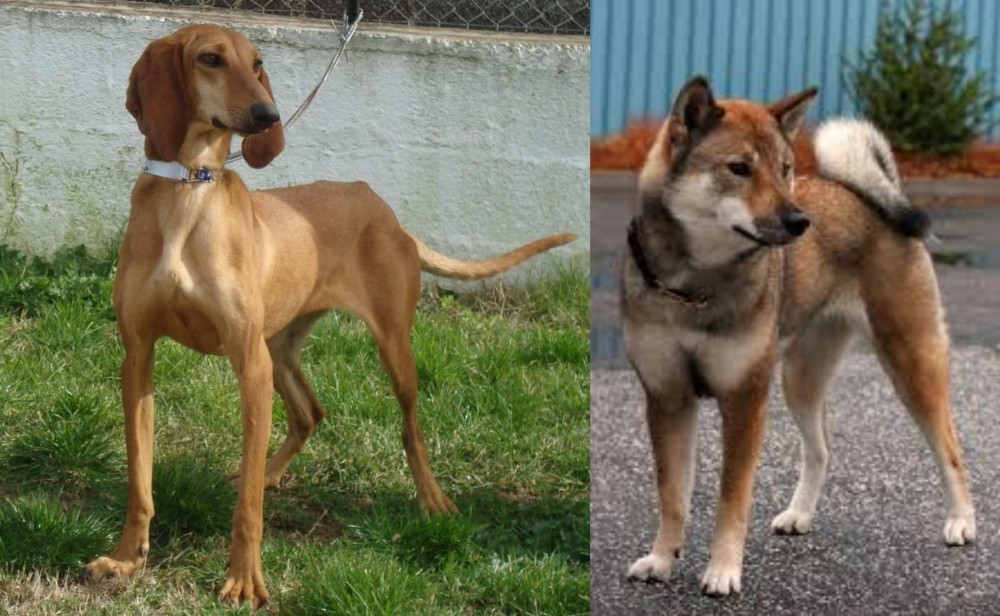 Segugio Italiano is originated from Italy but Shikoku is originated from Japan. Segugio Italiano may grow 49 cm / 20 inches higher than Shikoku. Segugio Italiano may weigh 26 kg / 57 pounds lesser than Shikoku. Both Segugio Italiano and Shikoku has almost same life span. Both Segugio Italiano and Shikoku has same litter size. Segugio Italiano requires Low Maintenance. But Shikoku requires Moderate Maintenance
Segugio Italiano is originated from Italy but Shikoku is originated from Japan. Segugio Italiano may grow 49 cm / 20 inches higher than Shikoku. Segugio Italiano may weigh 26 kg / 57 pounds lesser than Shikoku. Both Segugio Italiano and Shikoku has almost same life span. Both Segugio Italiano and Shikoku has same litter size. Segugio Italiano requires Low Maintenance. But Shikoku requires Moderate Maintenance
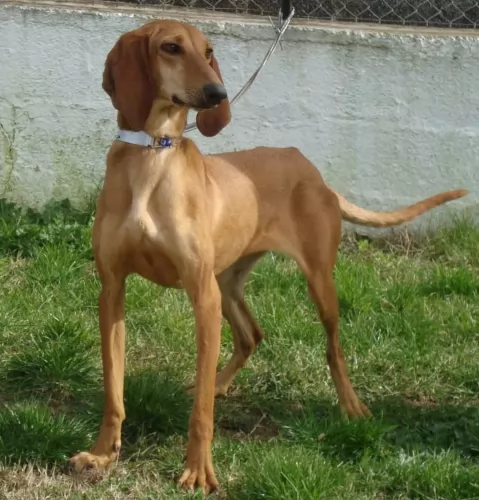 Known also as the Segit, the Segugio Italiano is an ancient dog breed believed to have descended from Egyptian hounds.
Known also as the Segit, the Segugio Italiano is an ancient dog breed believed to have descended from Egyptian hounds.
Both males and females stand at between 48 and 58cm and they weight between between 18 and 28kg. It’s a medium to large sized dog. The dog is a scenthound and was at first used for wild boar hunting in ancient times. Once wild boar numbers become much less, the Segit itself dropped in numbers, and it faced extinction.
Dedicated houndsmen worked hard to restore the numbers and the dog was successfully bred. It is a popular dog in Italy today. The Segugio Italiano isn’t recognized by the American Kennel Club whereas the Kennel Club in the UK recognizes it in the Hound Group.
 The Shikoku is from the Shikoku Island in Japan and they are very much like the Japanese Shiba Inu. There are six native Japanese dog breeds and the Shikoku is medium sized and sits in between the smaller Shiba Inu and the very large Akita Inu. All of the Japanese native breeds are members of the Spitz family. The Japanese have sorted their six breeds into 3 categories by size. Being medium size, the Shikoku is a member of the Shika-inus group. Others in this group are the Ainu Ken, the Kai Ken and the Kishu Inu. There are small differences between the three dogs in the Shika-inus group.
The Shikoku is from the Shikoku Island in Japan and they are very much like the Japanese Shiba Inu. There are six native Japanese dog breeds and the Shikoku is medium sized and sits in between the smaller Shiba Inu and the very large Akita Inu. All of the Japanese native breeds are members of the Spitz family. The Japanese have sorted their six breeds into 3 categories by size. Being medium size, the Shikoku is a member of the Shika-inus group. Others in this group are the Ainu Ken, the Kai Ken and the Kishu Inu. There are small differences between the three dogs in the Shika-inus group.
The Shikoku was bred to be a hunting dog in Kochi Prefecture to hunt boar and deer. Other names for the breed include Kochi-ken and Kishu dog or boar hound. This dog is considered to be the purest of the Japanese native dogs or Nihoken. They are today very , very rare. There are very few outsides of Japan, but some in North America are attempting to save the breed.
The are od Kochi Prefecture is a mountainous region with rough terrain that anyone outside of the area would have a hard time accessing. That is why the Shikoku is considered to be so pure as they were pretty well isolated in the mountains. The breeders were also isolated by the mountains and there was very little interbreeding. Although breeding the same dog, these different groups developed different lines of the Shikoku.
Documentation tells us that the number of originals lines was just two and these were the Western and Eastern Shikoku. The Western dog was known as the Mount Ishizuchi Shikoku and the Eastern as the Mount Tsurugi Shikoku. Within these two lines of Shikoku there are additional strains.
Within the Eastern line there is the Tokushima (lya) and the Koci-Aki strains. Within the Western line there is the Hata Uwahara, the Ehime-ken Shuso-gun and the Honkawa. Among these lines and strains, there are different coats and different colors; some heavier and some taller, but all figure into the development of the breed.
Finally, in the Showa Era the Japanese established the Dog Protective League and they began collecting the native dogs from around the country. They protected them so that the breed will go on. The Shikoku is today recognized as Foundation Stock by the AKC and it is fully recognized by the Japan Kennel Club, the Canadian Hound Club and the Shikoku has been declared a living Japanese “natural monument”.
Two bloodlines became the way the Shikoku were know after the war – the Honkawa and the Hata lines The Honkawa line were the descendants of the Choshun-go and the Hata line were the descendants of the Matsukaze-go. They bred the lines separately until 1955, when they mixed them to make the breed stronger. They are no longer considered separate in any way.
Because they are such primitive dogs, the Shikoku are good watch dogs and quite reserved with strangers. They need a lot of socialization to be a family pet but once they are, they make great companions. Intelligent, quick to learn and eager to please. Of the two lines of Shikoku dogs from the Western strains, the current Shikoku owes much of its current development to the Honkawa and Hata strains.
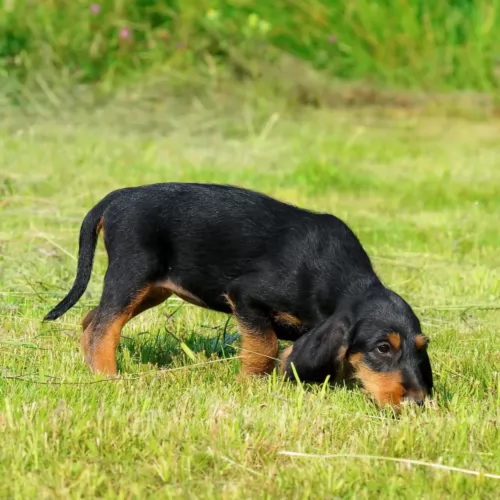 The Segugio Italiano has a distinctive look to him. He’s a large dog standing at between 68 and 76cm in height and weighing between 16 and 27 kg.
The Segugio Italiano has a distinctive look to him. He’s a large dog standing at between 68 and 76cm in height and weighing between 16 and 27 kg.
The body is lean and muscular and the Italian Scenthound has an amicable looking expression on his face. The coat of the dog is available in two types - short-haired or wire-haired.
The short-haired variety needs to be brushed on a weekly basis but is generally easy to maintain. Wire-haired dogs may require hand-stripping several times a year.
The coat of these dogs range from deep red to wheaten or black. Many dogs have white markings on the head, chest, feet, and the tip of the tail. The ears are long and floppy. If you want your dogs to have puppies, you can expect a litter size of between 4 to 6 puppies.
As a Scenthound, the Segugio Italiano is an intelligent dog, easily trained. He is best trained and socialized as he tends to be stubborn and he is also an independent strong-willed dog. It’s not an aggressive dog and yet it makes a good watchdog.
He’s adaptable but wouldn’t adjust well to living in a small space in the city.
 Today’s Shikoku is a medium sized breed with a Spitz like body – square with a head that is wedge shaped. The ears are pointed, and the tail is curved and feathered. They have arched toes and hard pads with dark, hard nails.
Today’s Shikoku is a medium sized breed with a Spitz like body – square with a head that is wedge shaped. The ears are pointed, and the tail is curved and feathered. They have arched toes and hard pads with dark, hard nails.
The two lines of the Shikoku are slightly different in built and look. The Honkawa strain is slender and athletic; agile and single coated. They have dark eyes and most of them are black and tan.
On the other hand, the Hata strain is much heavier boned, with the front more muscular than the rear. They have small ears, a wide skull and a strong undercoat. His eyes are shaped differently than the Honkawa. Their coats are also mostly red and tan.
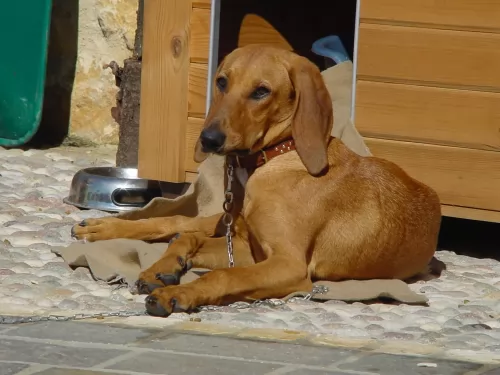 The amicable Segugio Italiano just wants to please. They get on well with children and pets. They’re easy going dogs that will require a good deal of exercise.
The amicable Segugio Italiano just wants to please. They get on well with children and pets. They’re easy going dogs that will require a good deal of exercise.
They make wonderful pets and companions, being particularly well suited to outdoor type of people. They make good watchdogs too, and with his interesting looks, his intelligence and gentle nature, you’re going to have an exceptional canine companion.
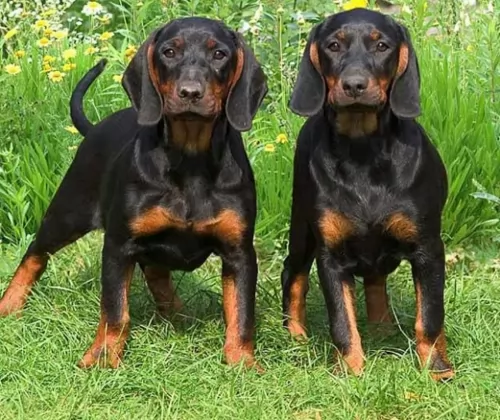 When you have a Segugio Italiano, you’re not likely to be spending much money at the vet, as these dogs are fairly healthy.
When you have a Segugio Italiano, you’re not likely to be spending much money at the vet, as these dogs are fairly healthy.
If your pet does show signs of illness, as a responsible pet owner it is your job to get him pet to the vet quickly as this can prevent other problems developing.
Dogs with such long ears can be more prone to ear infections. Your pet can be in pain and he will shake his head and paw at the infected ear. He may also be vomiting from nausea. You need to get your dog to the vet as soon as possible because with severe ear infection cases, there can even be facial nerve damage.
 Being isolated as they were, the Shikoku was a fairly healthy breed, no genetic testing has been done. Despite this they suffer a few of the same potential issues as other breeds their size.
Being isolated as they were, the Shikoku was a fairly healthy breed, no genetic testing has been done. Despite this they suffer a few of the same potential issues as other breeds their size.
Otherwise this is an agile and hardy breed with no known congenital health issues.
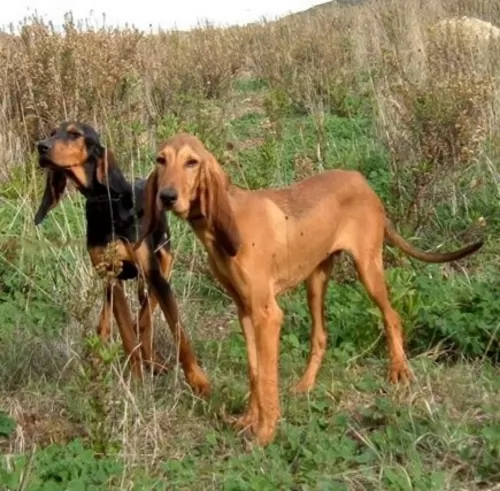 The Segugio Italiano comes with two coat types, the short-haired variety as well as the wire-haired variety. The short-haired dog will need to be brushed at least twice a week, while the wire-haired dog may require hand stripping.
The Segugio Italiano comes with two coat types, the short-haired variety as well as the wire-haired variety. The short-haired dog will need to be brushed at least twice a week, while the wire-haired dog may require hand stripping.
Segugio Italianos love a good bout of exercise, and out on the hunt they are constantly on the move. They’re known for their stamina, but once back at home, they can settle down quite calmly. Make sure this pet of yours is well exercised, whether walks, running off his leash or ball games.
Have a good look at the size of your dog, his age and energy levels before choosing dog food. When feeding your dog, don’t make it all complicated. All your dog wants is a simple, nutritious meal.
There are good commercially manufactured dog foods on the market and by reading the labeling you can ensure the best kibble for your pet. Try and give him some home made food too.
Boiled chicken, brown rice or pasta and spinach, sweet potatoes and carrots are a healthy choice for your pet – simple, tasty and nutritious. You can add a little bit of this twice a week to the dry kibble. Your dog will love it and it won’t cause any digestive problems.
 Feeding the puppy Be careful with feeding the puppy and adult as the breed is known to have a tendency toward obesity. Fresh food is better as it is what the breed has been used to, but a high quality puppy kibble is acceptable. Feed three times per day.
Feeding the puppy Be careful with feeding the puppy and adult as the breed is known to have a tendency toward obesity. Fresh food is better as it is what the breed has been used to, but a high quality puppy kibble is acceptable. Feed three times per day.
2.Feeding the adult He is a high energy dog so feed a high energy food designed for a medium sized dog. Feed in two meals each day.
4. Games and Exercises You will need a fenced yard for this breed and time to play with them. If not, you would need time to walk her more than once a day. They love to play indoors as well, chasing balls, learning new things. The breed make great companions for hiking, swimming, play frisbee or catch outside. They do well at agility, rally, obedience and flyball.